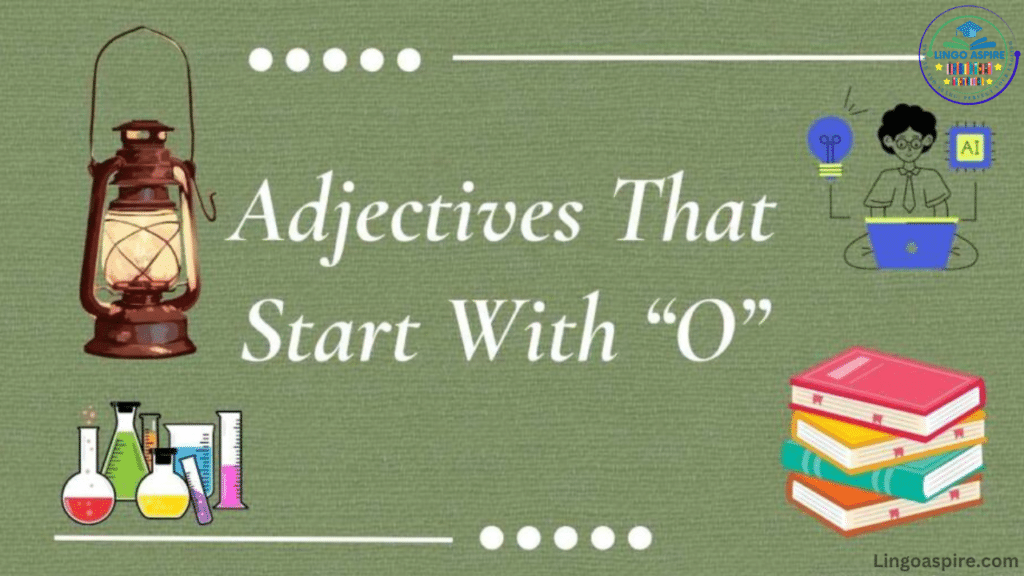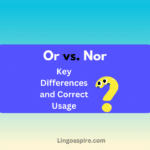Adjectives help describe people, places, and things. They add color and detail to writing. Among them, adjectives that start with O offer a range of expressions. Some words uplift, while others criticize. Writers and speakers use them in storytelling, speeches, and everyday conversations. Understanding these words improves vocabulary and communication skills.
This article explores O adjectives in depth. We will look at positive adjectives that start with O, negative adjectives that start with O, and neutral adjectives that start with O. You will also find O words to describe someone, rare words, and example sentences. You will have a rich list of words for your writing and speech by the end.
Comprehensive List of Adjectives That Start With O
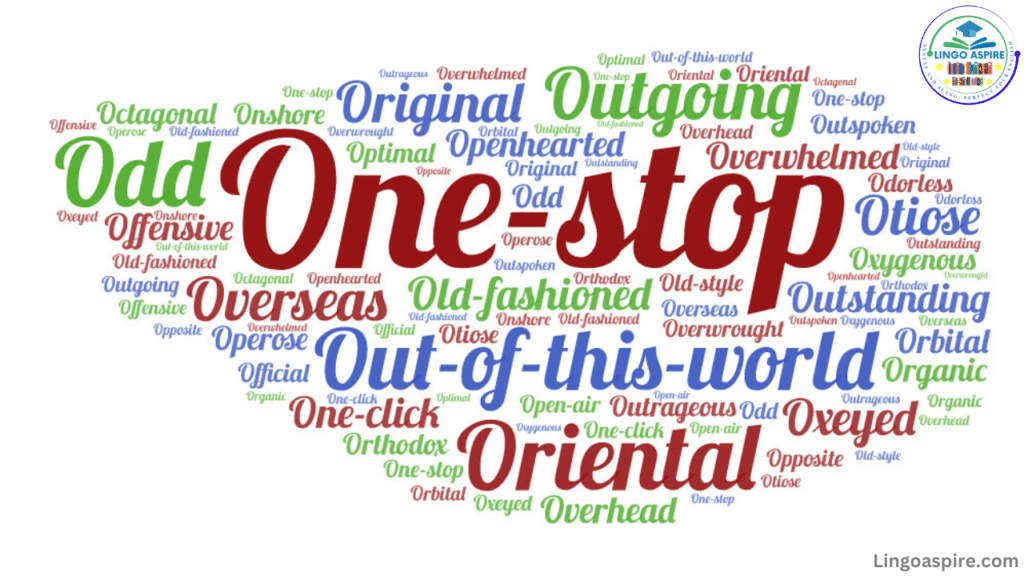
Positive Adjectives That Start With O
Some adjectives beginning with O express positivity, optimism, and energy. They describe people, situations, or things in a good way. These words help in compliments, writing, and personal development.
| Adjective | Meaning | Example Sentence |
|---|---|---|
| Optimistic | Having a positive outlook | She is optimistic about the future and always looks on the bright side. |
| Outstanding | Exceptionally good | His performance in the competition was truly outstanding. |
| Open-minded | Willing to consider new ideas | She is very open-minded and always willing to listen to different perspectives. |
| Original | Unique and creative | His original design for the project won him first place. |
| Obliging | Willing to help others | He was obliging and helped me carry the heavy bags without hesitation. |
| Opulent | Rich and luxurious | The opulent mansion had grand chandeliers and gold-plated fixtures. |
| Overjoyed | Extremely happy | She was overjoyed when she received the news of her promotion. |
| Outgoing | Friendly and sociable | He’s very outgoing and loves meeting new people at parties. |
| Observant | Quick to notice things | Her observant nature made her the best detective in the team. |
| Open-hearted | Kind and sincere | She gave an open-hearted welcome to all the new employees. |
People use adjectives like “optimistic” and “outstanding” to motivate and inspire. “Open-minded” and “original” help describe creative and thoughtful individuals. These words make writing and speech positive and engaging.
Negative Adjectives That Start With O

Not all O adjectives are uplifting. Some describe bad qualities, rude behavior, or negative experiences. Writers use them to express displeasure or criticism.
| Adjective | Meaning | Example Sentence |
|---|---|---|
| Obnoxious | Annoying and unpleasant | His obnoxious behavior made everyone uncomfortable at the party. |
| Overbearing | Domineering and bossy | Her overbearing attitude made it difficult to work with her. |
| Oppressive | Harsh and unjust | The oppressive heat made it hard to enjoy the outdoor event. |
| Obscene | Offensive and shocking | His obscene language shocked everyone in the room. |
| Outrageous | Shockingly bad | The outrageous price of the concert tickets left everyone stunned. |
| Overcritical | Too harsh in judgment | She was overcritical of her team’s work, making them feel discouraged. |
| Oafish | Clumsy and awkward | His oafish movements knocked over the vase, breaking it into pieces. |
| Overconfident | Too sure of oneself | He was overconfident about the test and didn’t prepare enough. |
| Opinionated | Holding strong, rigid views | She’s so opinionated that she rarely listens to other people’s thoughts. |
| Outdated | No longer useful or relevant | The technology they were using was outdated and needed an upgrade. |
These words are useful in constructive criticism, storytelling, and debate. For instance, “overbearing” describes someone who dominates conversations, while “oppressive” describes harsh rules or leaders. Writers and speakers should use negative adjectives that start with O carefully to avoid offending others.
Neutral Adjectives That Start With O
Some descriptive words starting with O are neutral, meaning they don’t carry strong positive or negative meanings. Their interpretation depends on context.
| Adjective | Meaning | Example Sentence |
|---|---|---|
| Official | Related to authority | The official report confirmed the company’s financial growth. |
| Ordinary | Common, not special | He lives in an ordinary neighborhood with no special features. |
| Objective | Based on facts, not opinions | The report was objective, presenting facts without bias. |
| Oblique | Indirect or slanting | Her oblique comments made it hard to understand her true intentions. |
| Opaque | Not transparent, unclear | The window was opaque, preventing any view outside. |
| Overdue | Late, past due | The library book was overdue by two weeks, and fines had accumulated. |
| Operational | Working, in function | The new machinery is now fully operational, improving productivity. |
| Outlying | Far from the center | They lived in an outlying village, far from the city’s hustle and bustle. |
| Ongoing | Continuing, still happening | The ongoing investigation aims to uncover the truth behind the scandal. |
| Orderly | Organized and neat | The classroom was orderly, with everything in its place. |
These words help in formal writing, academic papers, and everyday descriptions. “Objective” is used in research and reporting, while “opaque” can describe foggy glass or unclear statements. Understanding neutral adjectives that start with O allows for precise descriptions.
O Adjectives for Describing People
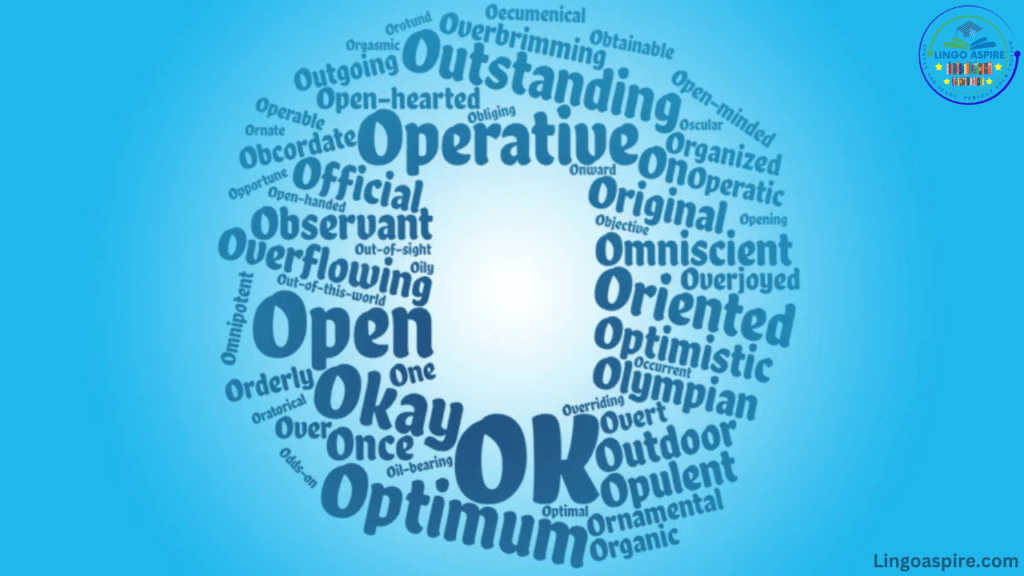
O words to describe someone range from positive to negative. These adjectives help writers and speakers create vivid character descriptions.
- Positive: Outgoing, open-hearted, optimistic, observant, obliging
- Negative: Overbearing, obnoxious, opinionated, overconfident, oafish
- Neutral: Objective, ordinary, official, orderly, opaque
For example:
- “She is an observant teacher who notices every detail in the classroom.”
- “His opinionated nature makes it hard to have discussions with him.”
- “The judge was objective, basing decisions on facts.”
Writers should choose the right O adjectives for personality to create believable and engaging characters.
O Adjectives for Different Contexts
Descriptive Words for Emotions & Feelings
O adjectives for emotions describe feelings in different situations.
- Positive emotions: Overjoyed, optimistic, open-hearted, outgoing
- Negative emotions: Overwhelmed, outraged, oppressive, obnoxious
- Neutral emotions: Objective, observant, ordinary, ongoing
Example sentences:
- “She felt overjoyed when she won the award.”
- “He was overwhelmed by the workload at his new job.”
Funny & Quirky Adjectives That Start With O
Some odd adjectives beginning with O add humor and uniqueness to speech.
- Oafish – Clumsy and silly
- Outlandish – Strange, bizarre
- Overzealous – Too eager, extreme enthusiasm
- Orotund – Pompous or overblown in speech
- Obstreperous – Noisy and difficult to control
These words bring fun and expressiveness to language. “Outlandish” can describe mad outfits, while “oafish” fits clumsy behavior.
Sophisticated & Rare O Adjectives
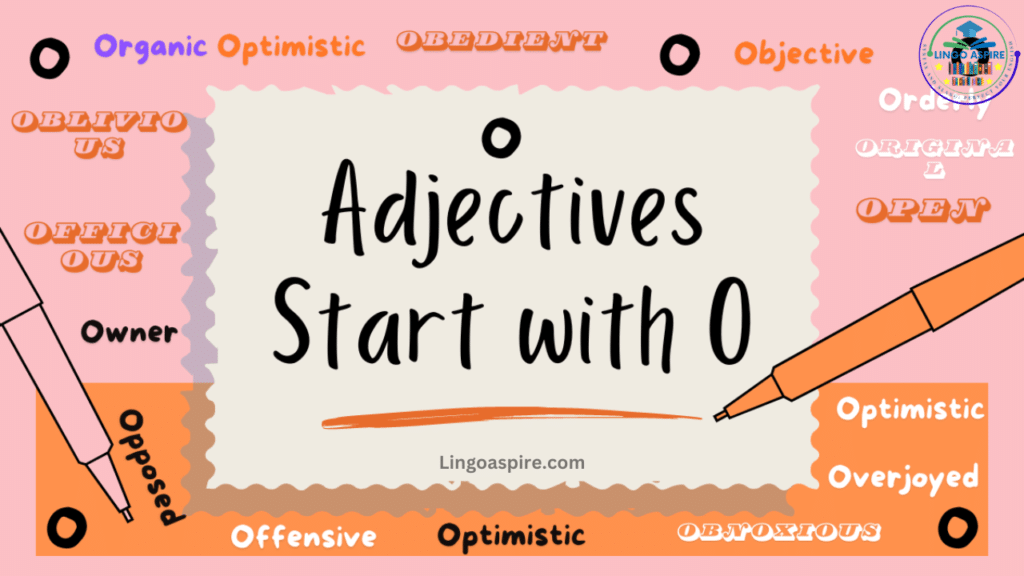
Some obscure adjectives starting with O sound elegant or intellectual.
- Omniscient – All-knowing
- Operatic – Dramatic, exaggerated
- Orotund – Full, strong voice
- Obsequious – Overly submissive
- Oscitant – Yawning or dull
Writers use these words in literature, speeches, and high-level writing.
Example Sentences Using Adjectives That Start With O
To understand how to use O adjectives for writing, here are sentence examples:
- “The outstanding performance left the audience speechless.”
- “His overconfident attitude led to mistakes in the project.”
- “She gave an objective review of the film.”
- “The castle had an opulent design with gold and marble.”
- “Their outlandish costumes made them stand out at the party.”
Conclusion
Adjectives that start with O add variety and depth to writing. From positive adjectives that start with O like “optimistic” and “outstanding” to negative adjectives that start with O like “obnoxious” and “oppressive,” each word has its purpose. Neutral adjectives that start with O like “objective” and “official” provide balance. Writers can also explore old-fashioned adjectives, opinionated adjectives, and overpowering words to enrich their vocabulary.
Learning and using O adjectives with meaning helps in better storytelling, descriptions, and conversations. Keep exploring words, and let language bring your thoughts to life!
Sources
1. Merriam-Webster Dictionary
Provides detailed definitions, usage examples, and word origins.
2. Oxford English Dictionary
A highly authoritative source for word meanings, historical usage, and etymology.
3. Thesaurus
Offers synonyms, antonyms, and related descriptive words.

